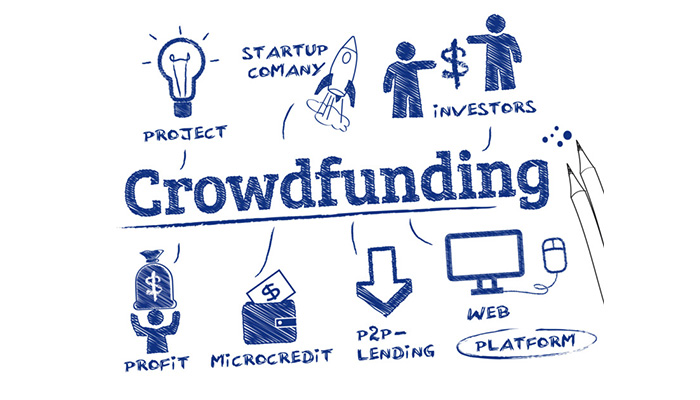Startup Crowdfunding: A Comprehensive Guide for Entrepreneurs
Crowdfunding has emerged as a revolutionary way for startups to secure funding without the need for traditional investors or loans. It allows entrepreneurs to raise capital from a large number of individuals, typically through online platforms. In this guide, we’ll explore the concept of startup crowdfunding, its benefits, the different types available, and how you can leverage it to fuel your business growth.

What is Startup Crowdfunding?
Startup crowdfunding is the process of raising small amounts of money from a large number of people, typically via online platforms, to fund a new business venture. This model enables entrepreneurs to gain financial support without going through traditional methods like bank loans or venture capital.
By leveraging the power of social media and the internet, crowdfunding allows startups to directly connect with potential investors and backers who believe in their product or idea. This democratizes access to funding, making it easier for innovative businesses to get off the ground.
Why Should Startups Consider Crowdfunding?
Crowdfunding offers several compelling reasons why startups should consider this route for raising capital:
-
Access to a Large Pool of Investors: Rather than relying on a few large investors, crowdfunding allows you to tap into a global network of potential backers.
-
Marketing and Exposure: A successful crowdfunding campaign can serve as an excellent marketing tool, helping your startup build brand awareness and gain attention from the media and industry influencers.
-
Validation of Your Idea: Crowdfunding provides a platform for customers to express interest in your product or service before it hits the market, serving as a real-time validation of your business idea.
-
No Equity or Debt: Depending on the type of crowdfunding, you might not have to give away equity or take on debt. Some models, like donation-based crowdfunding, don’t require you to give anything in return.
Types of Startup Crowdfunding
There are various types of crowdfunding, each catering to different types of businesses and funding needs. Here’s a breakdown of the main types:
1. Reward-Based Crowdfunding
In reward-based crowdfunding, backers contribute money in exchange for a reward, often in the form of the product or service being developed. This is one of the most common crowdfunding models used by startups.
Popular Platforms: Kickstarter, Indiegogo
Pros:
-
No equity or debt given up.
-
You can offer exciting rewards that attract backers.
-
Provides market validation.
Cons:
-
Success depends on the appeal of your rewards.
-
You may need to manage and fulfill orders for your rewards.

2. Equity Crowdfunding
Equity crowdfunding allows backers to invest in your startup in exchange for equity or ownership in the company. This is a great option for businesses looking to secure larger sums of money and offer long-term returns to investors.
Popular Platforms: SeedInvest, Crowdcube
Pros:
-
You raise capital without having to take on debt.
-
Investors may provide valuable expertise and networking opportunities.
-
Attracts serious investors interested in long-term success.
Cons:
-
You give up a portion of your business.
-
You may face regulatory hurdles and legal complexities.
3. Debt Crowdfunding (Peer-to-Peer Lending)
Debt crowdfunding involves borrowing money from individual lenders, which you will pay back with interest. This is ideal for startups that need funds but don’t want to give up equity.
Popular Platforms: Funding Circle, LendingClub
Pros:
-
Retain full control of your business.
-
Faster access to funding compared to traditional loans.
-
Flexible repayment terms.
Cons:
-
You have to pay back the loan with interest.
-
May be difficult to secure without a solid business plan.
4. Donation-Based Crowdfunding
Donation-based crowdfunding allows individuals to contribute money without expecting anything in return. This type is typically used for charitable causes or startups with a strong social impact focus.
Popular Platforms: GoFundMe, JustGiving
Pros:
-
No need to repay or offer equity.
-
Ideal for startups with a social mission or community-based projects.
-
Can generate goodwill and brand loyalty.
Cons:
-
Only suitable for certain types of businesses, particularly nonprofits.
-
May not generate substantial funds for all startup needs.
How to Run a Successful Startup Crowdfunding Campaign
Running a successful crowdfunding campaign requires careful planning and execution. Here’s how you can ensure your campaign gets the attention it deserves:
1. Set Clear Goals
Before launching your campaign, set a clear financial target. Make sure this target reflects your startup’s needs, such as product development, marketing, or operational costs. It’s important to be realistic about how much funding you need and how you plan to use it.
2. Create a Compelling Story
People don’t just invest in products; they invest in stories. Craft a compelling narrative around your startup. Explain why your product or service matters, how it solves a problem, and what makes your team unique. A personal, authentic story will resonate with potential backers and increase your chances of success.
3. Offer Attractive Rewards
For reward-based crowdfunding, offering rewards is a key element. These rewards should be desirable and valuable to your backers. Early bird specials, limited-edition products, or personalized items can entice people to back your campaign.
4. Build a Community Before Launch
Start building a community around your startup before you even launch your campaign. Engage with potential customers and supporters on social media, attend relevant events, and share your journey. The more people you have engaged before launching, the more likely they are to back your campaign.
5. Promote Your Campaign
Once your campaign is live, it’s time to promote it. Use social media, email newsletters, and PR to get the word out. Engaging influencers or bloggers to spread the word about your campaign can also help you reach a larger audience.
Benefits of Crowdfunding for Startups
Crowdfunding offers numerous advantages for entrepreneurs looking to launch a startup. Here are some of the most significant benefits:
1. Access to Capital Without Giving Up Equity
Crowdfunding, especially reward-based and donation-based models, allows startups to raise money without giving up ownership or control of their business. This is particularly advantageous for entrepreneurs who want to maintain full decision-making power.
2. Market Validation
A successful crowdfunding campaign can serve as proof of concept for your product. The amount of support you receive reflects the demand for your product, which can be valuable when approaching traditional investors or partners in the future.
3. Community Building
Crowdfunding isn’t just about raising money—it’s about building a community of supporters who are emotionally invested in your success. These backers can help spread the word about your product, becoming loyal customers and advocates.
4. Low-Risk Funding
Compared to traditional funding methods, crowdfunding is relatively low-risk for entrepreneurs. Since you’re not taking on debt or giving up equity in many cases, there’s less financial pressure to succeed.
Risks and Challenges of Crowdfunding
While crowdfunding can be highly beneficial, it’s not without its risks. Here are some potential challenges:
-
Failure to Meet Your Funding Goal: If you don’t reach your funding target, you may not receive any of the funds, depending on the platform.
-
Managing Backer Expectations: If your campaign is successful, you’ll need to manage backer expectations, especially regarding timelines for product delivery.
-
Legal and Regulatory Hurdles: Some crowdfunding models, like equity crowdfunding, come with legal complexities, including securities regulations that you must comply with.
FAQs About Startup Crowdfunding
1. What’s the best crowdfunding platform for startups?
The best platform depends on your business model. If you’re offering a product, Kickstarter or Indiegogo might be ideal. For equity funding, try platforms like SeedInvest or Crowdcube.
2. How much should I raise in a crowdfunding campaign?
The amount you should raise depends on your business needs. Make sure your funding goal is specific, realistic, and aligned with your project’s goals.
3. Do I need to give up equity in my business for crowdfunding?
Not necessarily. Reward-based and donation-based crowdfunding typically don’t require you to give up equity. However, with equity crowdfunding, you will need to offer shares in your company.
4. Can crowdfunding help with product development?
Yes! Crowdfunding is an excellent way to raise the capital needed for product development. Plus, it offers the benefit of market validation to ensure there’s demand for your product before it launches.
Conclusion
Startup crowdfunding offers a unique and powerful way for entrepreneurs to fund their ventures while engaging with a community of passionate supporters. Whether you’re seeking early-stage funds, validating your product, or building your brand, crowdfunding can provide the necessary resources and exposure to help your startup thrive.
By choosing the right platform, crafting a compelling story, and promoting your campaign effectively, you can turn your crowdfunding efforts into a resounding success.







